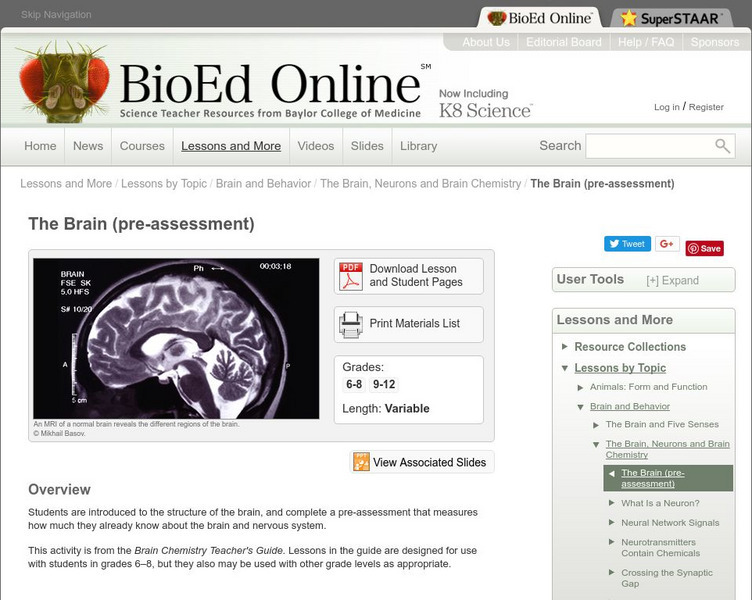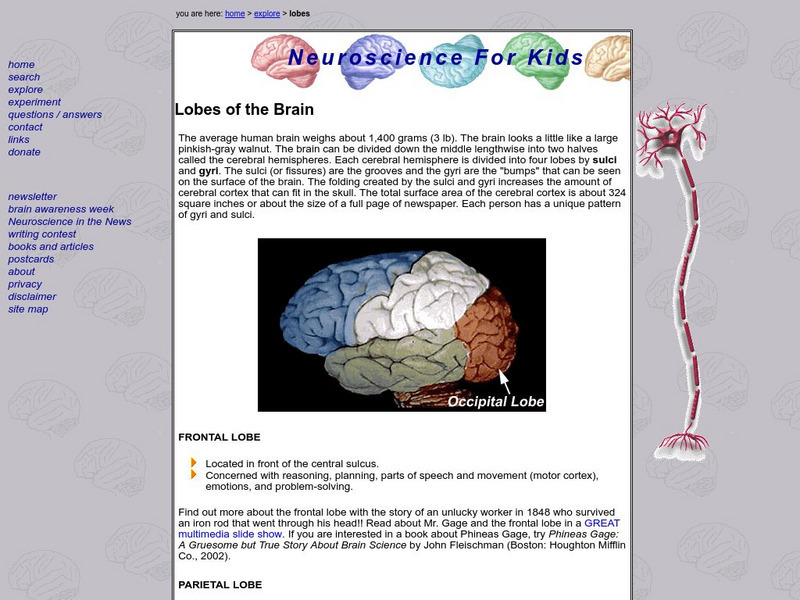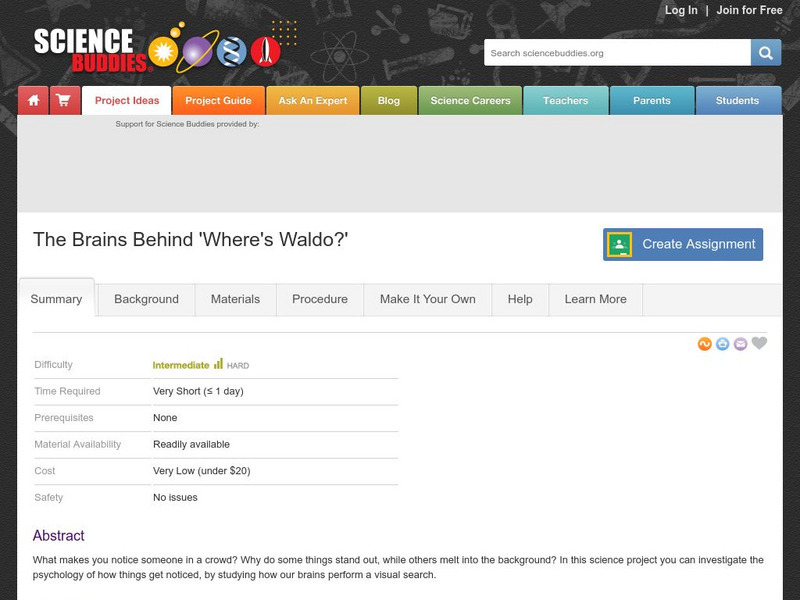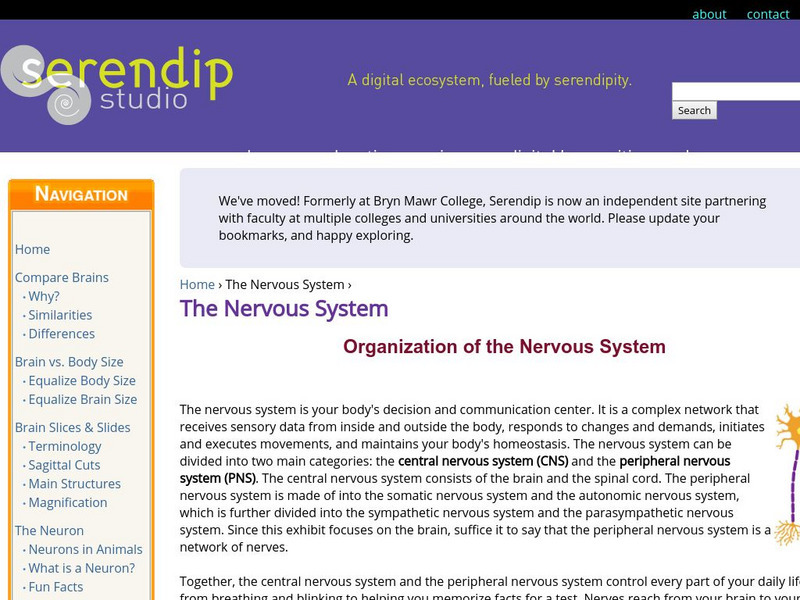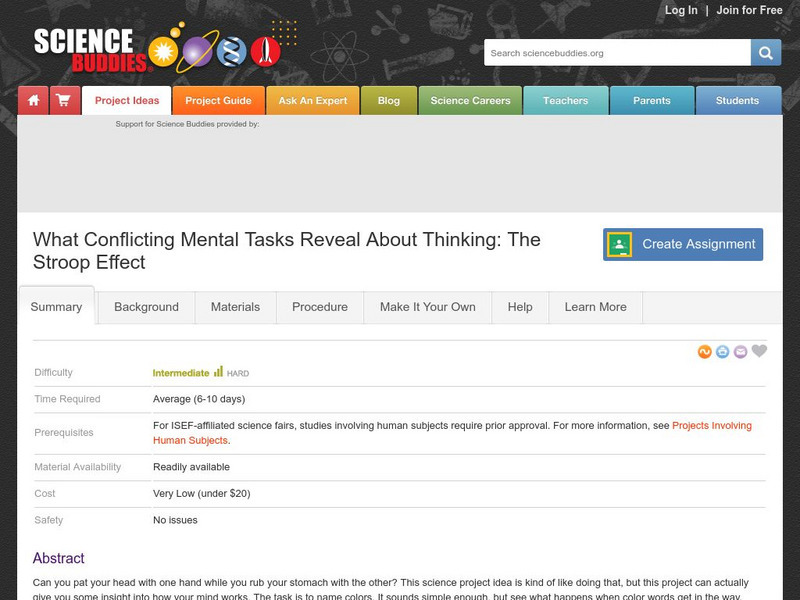BioEd Online
Bio Ed Online: The Brain: Control Central
What do you know about the brain? In this early learners lesson plan, students will explore the basic functions and characteristics of the brain and skull, and also learn about three major structures in the brain: the cerebrum,...
BioEd Online
Bio Ed Online: The Brain: Pre Assessment
The brain has unique physical characteristics and it is specialized into many different areas, each with a different job. Brain functions and abilities develop over time. Assess student's knowledge of the structure of the brain by having...
University of Washington
University of Washington: Lobes of the Brain
Site dealing with lobes of the brain. Links to various other sites with lots of information.
BioEd Online
Bio Ed Online: Our Sense of Smell
How does our sense of smell work? For this lesson young scholars use four different flavors of dry soft drink mix to investigate the sense of smell, and learn that the nose can detect very small particles in air, and transmit the...
National Cancer Institute at the National Institutes of Health
Seer Training Modules: Introduction to the Nervous System
Self-guided learning activity where students learn about the structure and function of the human nervous system. There is a short quiz at the end of the lesson to check for understanding.
Science Buddies
Science Buddies: The Brains Behind 'Where's Waldo?'
What makes you notice someone in a crowd? Why do some things stand out, while others melt into the background? In this experiment you can investigate the psychology of how things get noticed, by studying how our brains perform a visual...
Enchanted Learning
Enchanted Learning: The Brain
Learn about the brain, spinal cord, and brain cells at this thorough yet easy to read site. Simple sentence construction is used to explain the structure and function of this body system. A glossary is just a click away to explain...
Enchanted Learning
Enchanted Learning: The Brain
Learn about the brain, spinal cord, and brain cells at this thorough yet easy to read site. Simple sentence construction is used to explain the structure and function of this body system. A glossary is just a click away to explain...
BioEd Online
Bio Ed Online: Our Sense of Vision
Which parts of the body are involved in vision (seeing)? Is light important for vision? For this lesson students make kaleidoscopes to learn that light is essential to vision, and that the brain processes information from the eyes, which...
PBS
Pbs Teachers: Scientific American: Make Up Your Mind: Mind Mapping
Investigate the pseudoscience of phrenology and its attempt to organize and assign different purposes to different parts of the brain. Create a phrenology chart on a bathing cap and compare it to modern understanding of brain function...
Bryn Mawr College
Serendip: The Nervous System
Learn about the main sections of the human brain, and how the structure or each relates to its function.
TED Talks
Ted: Ted Ed: Your Brain Is More Than a Bag of Chemicals
Modern psychiatric drugs treat the chemistry of the whole brain, but neurobiologist David Anderson believes in a more nuanced view of how the brain functions. He illuminates new research that could lead to targeted psychiatric...
Science Buddies
Science Buddies: Paw Preference in Pets
The great majority of people have a distinct hand preference. The goal of this science fair project is to determine whether non-primate mammals (e.g., dogs or cats) have a paw preference, which might indicate lateralization of function...
Science Buddies
Science Buddies: What Conflicting Mental Tasks Reveal About Thinking
Can you pat your head with one hand while you rub your stomach with the other? This experiment is kind of like that, but it can actually give you some insight into how your mind works. The task is to name colors. It sounds simple enough,...
TED Talks
Ted: Ted Ed: Eye vs. Camera
Your eyes don't always capture the world exactly as a video camera would. But the eyes are remarkably efficient organs, the result of hundreds of millions of years of coevolution with our brains. The following video and guide outlines...
PBS
Pbs Teachers: Scientific American: Don't Forget! Memory Tests 9 12
Explore scientific research that says continued brain activity may delay or slow the loss of memory function. Investigate and practice different techniques to increase recall.

